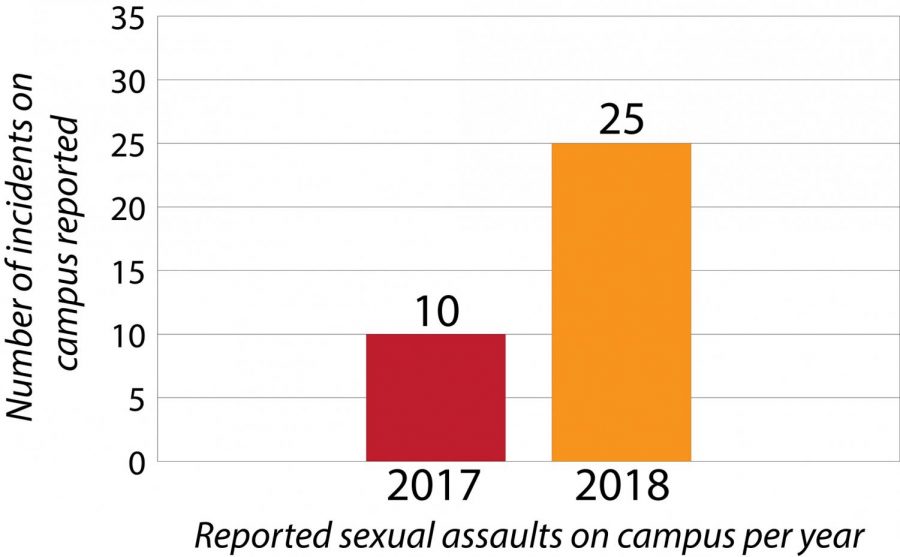Report finds increase in sexual assault on campus
WSU PD captain said one individual reported 12 incidents of sexual assault during one month
October 24, 2019
In 2018, there was a 150 percent increase in reported sexual assaults on WSU property as compared to 2017, according to the 2019 WSU Clery Report.
This crime and safety report is compiled every year by universities and is required under the Clery Act. The act also orders universities to outline their campus safety and violence prevention efforts, according to the Clery Center website.
Mike Larsen, captain of the WSU Police Department, said the crime statistics from the Clery Report are gathered by the records department and himself. He said he goes through all incident reports for the year and counts the number of incidents that are listed under what he calls “Clery crimes.”
He said Clery crimes include incidents such as manslaughter, sexual assault, burglary and arson. After counting the incidents, he checks whether the crimes occurred on campus and within the Clery geography. This includes everything on campus and any property owned by WSU, he said.
It also includes the housing of sororities and fraternities that are on campus and within good standing with WSU, Larsen said.
“I go back and essentially add those reported incidents, and then that’s how those numbers are calculated,” he said.
Larsen said the statistics gathered in the process are submitted to the Office of Civil Rights Compliance and Investigation, which creates the Clery Report.
Fourteen cases of dating violence were reported in 2018, and three were reported in 2017, according to the report.
Larsen said the Clery definitions of dating violence and domestic violence are very similar. He said dating violence is a reported incident of violence committed by a person against another in which they share a social, romantic or intimate relationship.
The incident is filed under dating violence unless it results in a felony or misdemeanor arrest, in which case it would be filed under domestic violence, he said. Under Washington law, the term dating violence does not exist.
Larsen said the reason the number of sexual assaults has increased is because of several incidents involving one individual. He said the individual reported to CRCI that she had been in an abusive relationship in which she was sexually assaulted about three times per week during a four-week period.
For that specific case, Larsen said he called the Clery help desk and explained the situation. He was told to report each sexual assault as a separate incident.
“Since the incidents have been reported, whether it’s in detail or whether it’s vague, we have to count that information,” he said.
Larsen said in some sexual assault cases, the individual reporting the crime sometimes does not want to go forward with an investigation.
“Regardless of the crime, I would hope that a victim would feel comfortable coming forward and reporting,” he said.
Every on-campus residence hall practiced more fire drills in 2018 than in both 2017 and 2016, according to the report.
Fire Chief Mike Heston said fire alarm drills are conducted at least twice a year for all dorms. He said the drills are conducted in the beginning of the fall and spring semesters.
Dorm drills are conducted consecutively in several dorms in one night. Drills on campus are conducted during the day, he said. This timeline maximizes the number of people who experience the drills.
“Alarms are your best friend to alert you to get you out of the building. The sprinklers are your best friend to keep you from burning up,” he said. “If all those things are working, you have a pretty good opportunity to get out.”
The fire department will inspect dorms for possible fire hazards such as door and wall decorations, he said.
Streit Hall, and the Kamiak and Steptoe Village campus apartment complexes each suffered one fire in 2018, but no one was injured, according to the report.
Heston said the frequency of the fire alarm going off is related to the activities occurring inside each building. He said common causes for the fire alarm going off in dorms include an abundance of steam from showers and cooking incidents.
He said most incidents that occur in on-campus apartments are cooking fires or dryer fires.
Burning popcorn in a microwave is a common incident in dorms, he said.
“Residence halls and on-campus apartments have these common places that are cooking areas,” he said. “You have people that are cooking, that probably aren’t the best cooks. So that’s another common cause.”
He said detectors will be moved if they repeatedly go off for false alarms such as steamy showers. Individuals in dorms who smoke marijuana or cigarettes are likely to set off the fire alarm, he said.
Heston said new on-campus residences including some dorms and apartments have a specific type of alarm system set up. If one alarm goes off and resets itself without another alarm going off, the fire department will not respond, he said.
“If you live in an area that has a group area and it has a smoke alarm in there that goes off, sometimes it’s only that alarm [that] goes off,” he said. “As soon as the smoke is cleared out of it, then it resets itself. So, we don’t get continually called to these nuisance alarms and people don’t have to evacuate.”
He said the second alarm going off would trigger a response alarm in the fire department. The department will also respond in cases when the sprinkler system goes off, he said.
Greek chapter housing is also equipped with alarm and sprinkler systems similar to the ones used in dorms, he said. The fire department inspects the systems frequently, he said.
Arrests for alcohol violations and drug violations both decreased between 2017 and 2018, according to the report. There were 75 arrests for alcohol violations in 2017 and 63 in 2018.
Thirty-seven people were arrested for drug violations in 2017 compared to 26 people in 2018.
Alcohol referrals increased from 234 cases in 2017 to 252 in 2018, according to the report. There were 11 fewer drug violations in 2018.
The number of reported burglaries also decreased from 23 cases in 2017 compared to 10 in 2018, according to the Clery report.
One case of burglary was reported in 2018 at the WSU Extension sites, which includes academic centers, agriculture research centers and county learning centers, according to the report. No other crimes were reported at these sites.
Larsen said some incidents are counted, but labeled as unfounded crimes. This includes investigated crimes with insufficient evidence.
He said in some cases, the incident reported never happened.
“Maybe it’s a football game weekend and sometimes people get intoxicated, and then they can’t remember where their car is parked,” he said. “They come in to record their car stolen and then we look for it, and it was never stolen.”
Laura Egan, senior director of programs at the Clery Center, said the act is meant to help students hold universities accountable for campus crime prevention and safety.
“We stress the value the Clery Act brings to campuses in providing a more clear picture of what violence looks like at their institution,” she said. “And what they can do to best respond to and prevent that violence, creating safer campuses for all students and employees.”
Egan said if an institution is found not compliant with the Clery Act, it can be charged a fine through a Department of Education program review. The university will also be required to correct whatever it is doing wrong.
Fines are about $57, 901 per violation for not complying with Clery, Egan said.
Larsen said the Clery Report is used to track broad categories of crimes in the area.
“I wish it was a little bit more consistent from place to place,” he said. “But it’s a good thing that keeps law enforcement on their toes.”
















